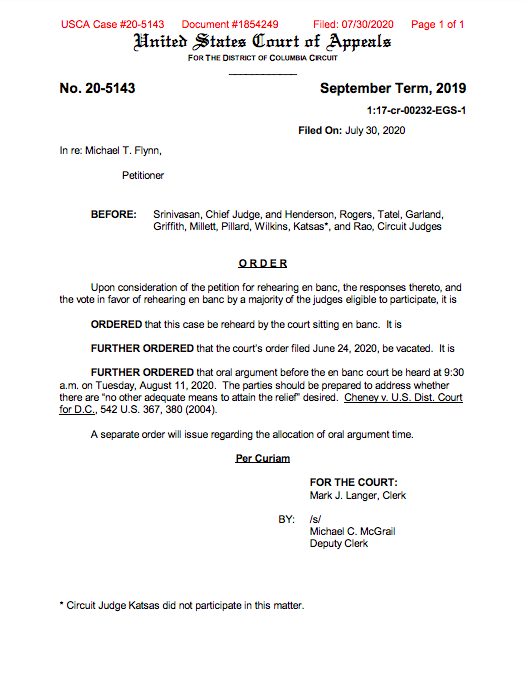An appeals court has agreed to take up the case against retired Lt. Gen. Michael Flynn, which the Justice Department is attempting to dismiss.
The U.S. Court of Appeals for the D.C. Circuit issued an order on Thursday that states that oral arguments for the en banc review by the full appeals court are scheduled for Aug. 11, after a three-judge appeals court panel agreed with the Trump administration and Flynn’s legal team, ordering the district court to allow DOJ lawyers to drop the charges. The order vacates the one dealt by the smaller panel last month.
Judge Emmet Sullivan, who is overseeing the Flynn case, had filed a petition for a rehearing of the case against President Trump’s former national security adviser by the full appeals court.
Flynn, a target of the special counsel Robert Mueller’s Russia investigation, pleaded guilty in December 2017 to lying to FBI investigators about his December 2016 conversations with a Russian envoy, but after changing legal teams, Flynn began to claim he was innocent and had been set up by the FBI. After Attorney General William Barr appointed U.S. Attorney Jeffrey Jensen to review the Flynn case, who has unearthed a host of new documents deemed exculpatory by Flynn’s lawyers, the Justice Department engaged in an effort to get the case dropped.
The order Thursday extends the timeline of the legal fight closer to the November election. It may put more pressure on Trump, who told reporters this month he hopes Flynn is “going to be able to win it,” to consider a pardon for his former adviser.
Sullivan, a President Bill Clinton appointee who has been handling the Flynn case since December 2017, appointed retired New York federal Judge John Gleeson to serve as an amicus curiae to present arguments in opposition to the DOJ’s motion and to explore whether Flynn should be charged with perjury or contempt.
Sidney Powell, the former federal prosecutor who took over Flynn’s defense last summer, has opposed the effort to have the full appeals court rehear the case. “WOW!” she tweeted in reaction to the news on Thursday.
“Judge Sullivan’s stubborn disagreement with the Government’s decision to dismiss the case does not confer the right to contest it himself or through his amicus. His actions smack of vindictive animus against General Flynn and judicial overreach that have no place in America’s justice system. No precedent even suggests a ‘hearing’ on a substantial government motion to dismiss. Not one,” Flynn’s legal team said earlier in July. “General Flynn’s personal freedom is at stake. He cannot travel freely, obtain employment, or enjoy a normal life until this case is dismissed. His very liberty is wrongly impaired until the dismissal is granted.”
But Sullivan’s lawyer, Beth Wilkinson, claimed “the panel’s decision threatens to turn ordinary judicial process upside down.” She added, “It is the district court’s job to consider and rule on pending motions, even ones that seem straightforward. This Court, if called upon, reviews those decisions — it does not preempt them. … En banc review should be granted.”
Judge Neomi Rao, who was appointed by Trump in 2019, authored the June opinion ordering Sullivan to dismiss the Flynn case. She was joined by Judge Karen Henderson, appointed to the appeals court in 1990 by President George H.W. Bush. Judge Robert Wilkins, who made his way to the appeals court in 2010 after being appointed by President Barack Obama, issued a dissenting opinion.
“In its motion, the government explains that in light of newly discovered evidence of misconduct by the Federal Bureau of Investigation, the prosecution can no longer prove beyond a reasonable doubt that any false statements made by Flynn were material to a legitimate investigation,” Rao wrote, adding, “This is plainly not the rare case where further judicial inquiry is warranted. To begin with, Flynn agrees with the government’s motion to dismiss, and there has been no allegation that the motion reflects prosecutorial harassment. Additionally, the government’s motion includes an extensive discussion of newly discovered evidence casting Flynn’s guilt into doubt. … Insufficient evidence is a quintessential justification for dismissing charges.”
The Justice Department told the district court in May “that continued prosecution of this case would not serve the interests of justice” as it sought to drop the false statements charges against Flynn after new records were made public.
Flynn’s legal team and lawyers for the Justice Department argued separately before a three-judge appeals court in June that the higher court should grant a petition for a writ of mandamus and direct Sullivan to grant the Justice Department’s motion to drop the charges.
Recently declassified FBI documents show that the counterintelligence briefing FBI agent Joseph Pientka gave to Trump during the 2016 campaign was used as a pretext to gather investigative evidence on the Trump campaign and Flynn. Pientka and now-fired FBI special agent Peter Strzok interviewed Flynn at FBI Director James Comey’s behest in January 2017.
Documents declassified earlier this year indicate that Strzok abruptly stopped the FBI from closing its investigation into Flynn in early January 2017 at the insistence of the FBI’s “seventh floor” after the bureau had uncovered “no derogatory information” on Flynn. Emails showed Strzok, along with FBI lawyer Lisa Page and several others, sought to continue investigating Flynn, even considering the Logan Act.
Notes from Bill Priestap, the FBI’s former head of counterintelligence, show him asking, “What is our goal? Truth/Admission or to get him to lie, so we can prosecute him or get him fired?”

